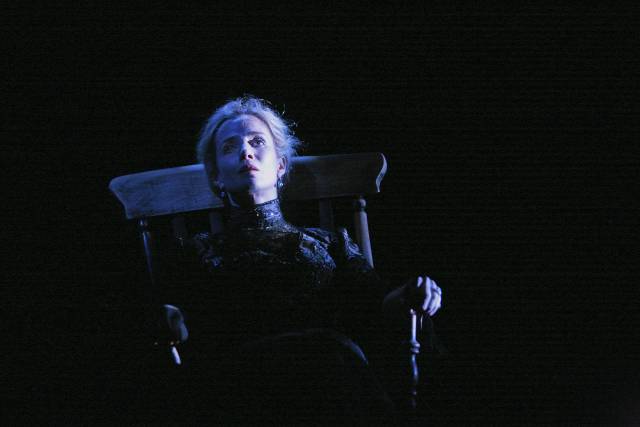

In Not I, the first of the evening’s three Beckett shorts at NYU's Skirball Center, Lisa Dwan is blindfolded and strapped to a wooden board in almost complete darkness. But we cannot see this. The only thing illuminated in the entire theater is her mouth, which spouts the lines of the rapid-fire play so quickly it’s dizzying. It is dark enough that audience members have trouble seeing the spectators next to them; the only image in sight is the small but frantic lips and teeth, chattering madly onstage, as if suspended in air, supported only by their own breathlessness.
It feels almost unfair to do anything but describe what Dwan does, one short play after the other. It is a terrifying experience, even for the most prepared audience, to watch this woman inhabit these words. Samuel Beckett himself commanded an elusive and daunting thing of anyone performing Not I: “don’t act.” It’s hard to imagine anyone getting this any more perfect than Dwan.
Footfalls is paced differently than Not I (which is likely the speediest of any Beckett piece you’ll ever see); much slower, it involves an abundance of steady, deadening pacing across the stage. With a mother-daughter relationship at its core, fraught with tension and an almost paranormal suspense, Footfalls is a grave and sobering meditation following the frenzied Not I.
Finally, there is Rockaby, one of Beckett’s most poetic – and most repetitive. The words “close of a long day” are echoed, once and again, but in the package of these performances, they feel applicable to more than just the elderly single character, a woman who rocks in her rocking chair, which seems to have a life force of its own. It is the close of Dwan’s performances; it is the close of our difficult and enthralling experience of these plays.
Placed together, these three plays reflect the life cycle of a troubled woman. First, she is young and breathless in Not I, searching frantically, never resting for a second. Then she is a young adult, unsure of herself and in a constant confrontation with her mother in Footfalls. And the weight of her life has come to haunt her prematurely in the finality of Rockaby.
In the hands of Dwan, all of these plays are effectively one-woman shows (even if there are sometimes more characters present in essence). But the stage directions of Not I call for a second character in addition to the Mouth. This character is the Auditor, who stands downstage left “on an invisible podium,” dressed “from head to foot in loose black djellaba, with hood.” The cloaked Auditor is a presence as ominous as his name might suggest. He doesn’t have a single line, and is barely instructed to move. Most incarnations of Not I omit the Auditor. From what I could tell, this production followed suit. But it was very, very dark in there (and plenty ominous). Can’t be sure.